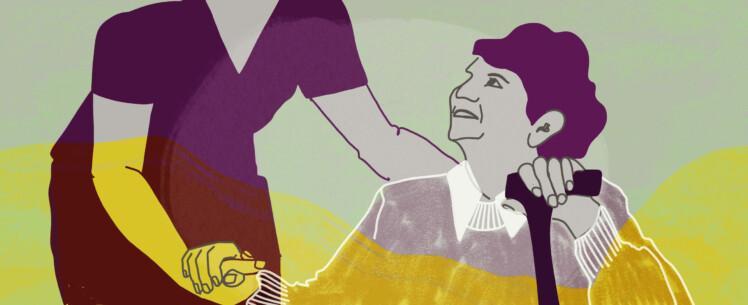
How can nurses help and support stigmatized carers?
It is imperative that social and health care workers recognize and support the work of the carers, in order to enable and sustain an effective and compassionate healthcare system for both carers and the cared ones.
A carer is defined as a person who helps and provides support to someone who is unable to cope with everyday activities due to illness or disability. Support can be provided by spouses, parents, children, or other family members.
Carers do very important work voluntarily. No law in Finland forces a carer to help the loved one or relative. Some countries such as the United States of America have Filial responsibility laws which require people to take care of their relatives.
Carers’ gender, age, and duties of care vary. It is estimated that over a million Finns help and support their family members, with 350,000 of them being primary caregivers (Omaishoitajaliitto, n.d.). They not only assist with everyday activities but also guide their cared ones in finding services.
It is notable that without carers, the costs for society of providing care would be much higher, almost 1.25 billion euros a year (THL, 2024).
Mental health impact of caring on carers
Depression is a significant concern among carers in Nordic countries. Statistics show there are 2,4 million carers in Finland, Denmark, and Sweden. Studies indicate high prevalence rates and notable impacts on the well-being of carers in Finland. For instance, 61,5 per cent of family carers for individuals with Alzheimer’s disease experienced depressive symptoms at the time of diagnosis, and about one-third continued to experience these symptoms persistently over a five-year period (Jokinen et al., 2023). Additionally, carers in Scandinavian countries, including Finland, have higher odds of experiencing sleep problems, which are often associated with depression (Johansson et al., 2018). A nationwide register-based study revealed that Finnish family carers providing high-intensity care had a higher use of antidepressants compared to a matched control population, suggesting an increased prevalence of depression among carers. These findings highlight the substantial psychological strain faced by carers in Finland.
It is estimated that over a million Finns help and support their family members, with 350,000 of them being primary caregivers.
At workplace carers encompasses discrimination and negative perceptions due to their caregiving responsibilities. Many carers also work, and many of them are unsure of how to balance their time and energy between work, family, and caregiving, as well as their personal lives. It is ideal to talk to their employer, occupational health care, along with a social worker about the arrangements for combining work and informal care. Society must address these concerns by enacting family-supportive policies, flexible work practices, and a culture which pays attention to the needs of employees juggling caregiving and the demands of their professional role (Kossek et al., 2017).
Holidays should be made mandatory because of the physical and mental energy it take to be a caregiver. Many organizations in Finland have started to raise awareness concerning this, an example is the partnerships with social holiday organizations such as Maaseudun Terveys- ja Lomahuolto (n.d.), Solaris-lomat (2025), and Hyvinvointilomat (n.d.) which organize carer holidays annually.
Supporting carers
When carers meet nurses for help, nurses should look out for emotional and psychological signs, such as persistent sadness, hopelessness, anxiety, irritability, emotional exhaustion, and lack of interest in previously enjoyed activities.
Cognitive and functional signs can include impaired focus, forgetfulness, trouble making judgments, and diminished capacity to handle everyday duties that could impact the caregivers’ performance.
Who can help caregivers? Social services ensure that stigmatized caregivers are treated equally, receiving the same salaries and holiday benefits as their fellow healthcare providers. This helps relieve stress and the feeling of not measuring up to colleagues.
When meeting stigmatized caregivers, nurses should provide support by directing them to organizations like Omaishoitajaliitto and International Alliance of Carer Organizations which assist caregivers in overcoming depression and support them physically, emotionally, and mentally.
References
Hyvinvointilomat. (n.d.) https://hyvinvointilomat.fi/
International Alliance of Carer Organizations. (n.d.) https://internationalcarers.org/
Johansson, A., Long, K., & Rasmussen, H. (2018). The impact of caregiving on sleep disturbances and mental health among Scandinavian caregivers. Journal of Affective Disorders, 240, 110-118. Retrieved from https://www.sciencedirect.com/science/article/pii/S0022395617306477
Jokinen, H., Koivisto, A. M., & Hiltunen, A. (2023). One in three Alzheimer’s disease family caregivers has persistent symptoms of depression. University of Eastern Finland. https://www.uef.fi/en/article/one-in-three-alzheimers-disease-family-caregivers-has-persistent-symptoms-of-depression
Kossek, E. E., Thompson, R. A., Lawson, K. M., Bodner, T., Perrigino, M. B., & Hammer, L. B. (2017). Caring for the elderly at work and home: Can a randomized organizational intervention improve psychological health? https://stacks.cdc.gov/view/cdc/55688/cdc_55688_DS1.pdf
Maaseudun Terveys- ja lomahuolto. (n.d.) https://mtlh.fi/
Omaishoitajaliitto. (n.d.) Briefly in English. https://omaishoitajat.fi/in-english/
Solaris-lomat. (n.d.) https://www.solaris-lomat.fi/
THL. (2024). Omaishoidon kansallisesti yhtenäisiin myöntämisperusteisiin on vielä matkaa – suositukset ohjaavat alueita. https://thl.fi/-/omaishoidon-kansallisesti-yhtenaisiin-myontamisperusteisiin-on-viela-matkaa-suositukset-ohjaavat-alueita
Wikipedia. (n.d.) Filial responsibility laws. https://en.wikipedia.org/wiki/Filial_responsibility_laws
Pysyvä osoite: http://urn.fi/URN:NBN:fi-fe2025041125760